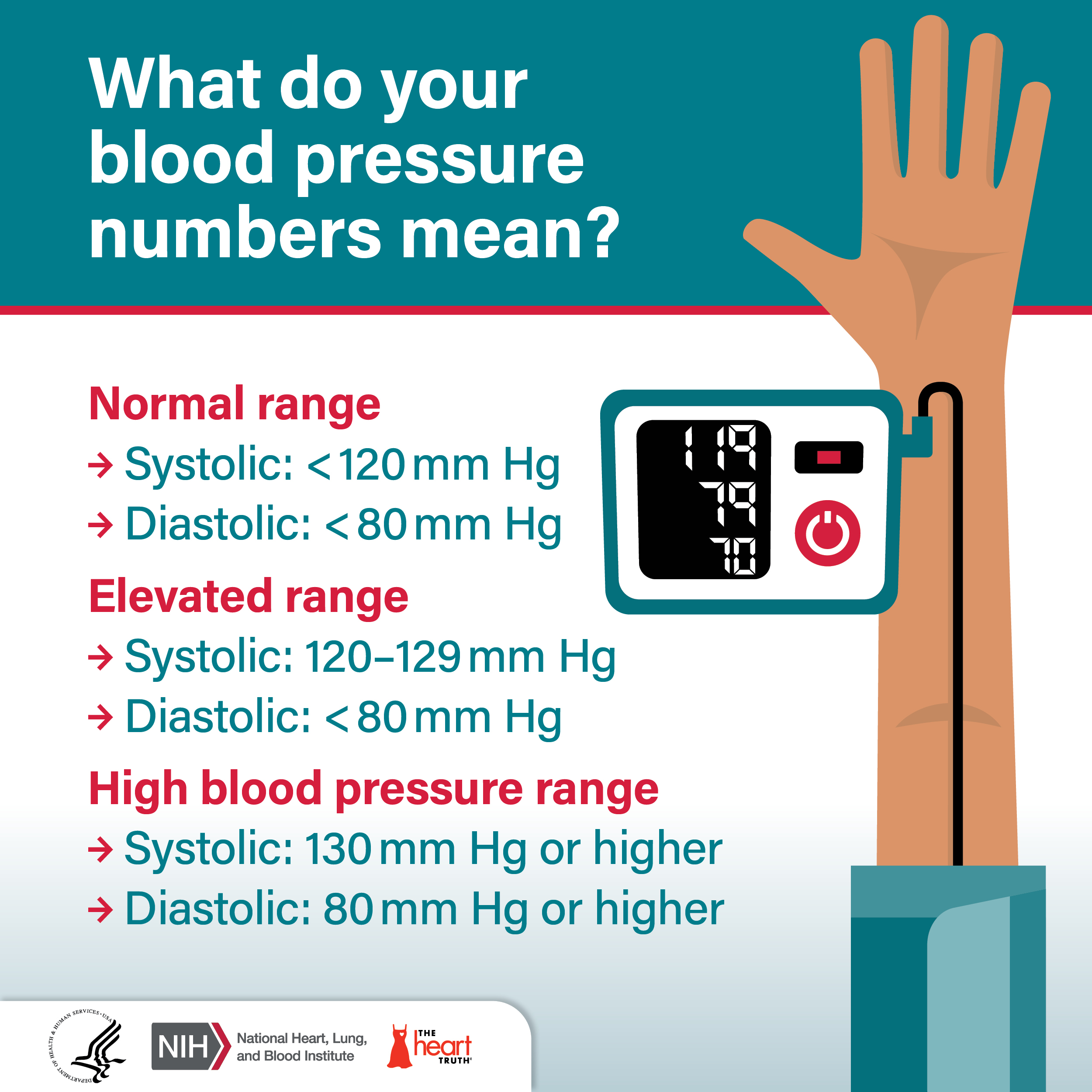High blood pressure, also known as hypertension, is often “silent,” meaning it doesn’t usually cause symptoms. But consistently high blood pressure can increase your risk of heart disease, kidney disease, eye damage, dementia and stroke. Knowing and keeping track of your blood pressure numbers is the first step in taking care of your heart.
For most adults, healthy blood pressure is 120/80 millimeters of mercury or less. Your doctor might recommend lowering your blood pressure if it’s between 120/80 and 130/80 and you have other risk factors for heart or blood vessel disease.

Consider these tips from experts with the National Heart, Lung, and Blood Institute’s (NHLBI) The Heart Truth® program:
- Know Your Numbers
Everyone ages 3 and older should get their blood pressure checked by a health care provider at least once a year. Expert advice: 30 minutes before your test, don’t exercise, drink caffeine or smoke cigarettes. Right before, go to the bathroom. During the test, rest your arm on a table at the level of your heart and put your feet flat on the floor. Relax and don’t talk.
- Eat Healthy
Follow a heart-healthy eating plan, such as NHLBI’s Dietary Approaches to Stop Hypertension (DASH). For example, use herbs for flavor instead of salt and add one fruit or vegetable to every meal.
- Move More
Get at least 2 1/2 hours of physical activity each week to help lower and control blood pressure. To ensure you’re reducing your sitting throughout the day and getting active, try breaking your activity up. Do 10 minutes of exercise, three times a day or one 30-minute session on five separate days each week. Any amount of physical activity is better than none and all activity counts.
- Aim for a Healthy Weight
If you’re overweight, losing just 3-5% of your weight can improve blood pressure. If you weigh 200 pounds, that’s a loss of 6-10 pounds. To lose weight, ask a friend or family member for help or to join a weight loss program with you. Social support can help keep you motivated.
- Manage Stress
Stress can increase your blood pressure and make your body store more fat. Reduce stress with meditation, relaxing activities or support from a counselor or online group.
- Have a Healthy Pregnancy
High blood pressure during pregnancy can harm the mother and baby. It also increases a woman’s risk of having high blood pressure later in life. Talk to your health care provider about high blood pressure. Ask if your blood pressure is normal and track it during and after pregnancy. If you’re planning to become pregnant, start monitoring it now.
- Stop Smoking
The chemicals in tobacco smoke can harm your heart and blood vessels. Seek out resources, such as smoke free hotlines and text message programs, that offer free support and information.
- Work with Your Doctor
Get help setting your target blood pressure. Write down your numbers every time you get your blood pressure checked. Ask if you should monitor your blood pressure from home. Take all prescribed medications as directed and keep up your healthy lifestyle. If seeing a doctor worries you, ask to have your blood pressure taken more than once during a visit to get an accurate reading.
Know your blood pressure numbers by getting regular health check-ups at a primary care clinic.
CU Medicine Cardiology – Cherry Creek and CU Medicine Cardiology - Highlands Ranch Specialty Care Center provides high-quality, compassionate care for a full range of comprehensive cardiology services. Learn more here.
To find more information about high blood pressure as well as resources for tracking your numbers, visit nhlbi.nih.gov/hypertension.

